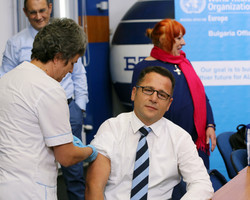The influenza season is over … for now

The 2018–2019 influenza season in Europe has finally drawn to a close, having begun in late November and peaked between late January and early February. The season was characterized by a dominance of influenza A viruses, with detection of both influenza A virus subtypes – A(H1N1)pdm09 and A(H3N2) – and very few influenza B viruses.
Some countries primarily saw the circulation of influenza A(H1N1)pdm09, some primarily saw the circulation of A(H3N2), and some saw the co-circulation of both.
A subset of Member States conduct and report data from surveillance for severe acute respiratory infections (SARI) among individuals admitted to the hospital. This season, 17 countries reported influenza-positive SARI cases. Of these, 99% were influenza A, mostly influenza A(H1N1)pdm09. The percentage of specimens from hospitalized patients testing positive for influenza was similar to that seen in previous years.
For the sixth time, the onset of the 2018–2019 influenza season was heralded by WHO/Europe’s annual Flu Awareness Campaign, which ran on 22–26 October 2018. The ideal time to begin promoting the advantages of getting immunized is before the influenza season hits, when countries start making influenza vaccines available.
WHO/Europe’s Flu Awareness Campaign for the coming 2019–2020 influenza season will run on 21–25 October 2019.
Raising awareness of influenza across Europe
WHO/Europe gave technical and financial support to Flu Awareness Campaign activities in 14 countries: Albania, Armenia, Bulgaria, Croatia, Czechia, Estonia, Lithuania, Poland, Romania, the Russian Federation, Slovakia, Slovenia, Turkmenistan and Ukraine.
Campaign activities included translating existing communications products into local languages, including Estonian, Lithuanian, Moldovan and Romanian. There were traditional poster and leaflet campaigns as well as more innovative social media materials, animated films and advertising on public transport.
In Albania, for example, a “Godasim Gripin” (Flu Fighter) webpage was created for the Institute of Public Health and all health institutions. Health authorities in Armenia worked with the WHO Country Office to join the Flu Awareness Campaign for the first time. Romania used Facebook to get the message across, while Croatia created a digital hub of downloadable materials. The Russian Federation developed a film that proved popular on YouTube. Slovenia and Bulgaria organized press conferences.
In many country offices, WHO staff led by example by being publicly immunized, including Dr Syla Skender (pictured here) in Bulgaria.
Getting a vital message across
A Facebook Live session on 24 October 2018 welcomed 2 medical doctors, Dr Dina Pfeifer from the WHO/Europe team and Dr Tyra Grove Krause from Denmark’s Statens Serum Institute, to answer questions from the public. More than 9000 people across the WHO European Region watched the session.
Dr Caroline Brown, Programme Manager for Infectious Hazard Management at WHO/Europe, said: “Our Flu Awareness Campaign aims to give countries in the European Region an opportunity to get their immunization campaigns started and to provide accessible, relevant and understandable information on seasonal influenza and preventive measures.”
“Vaccination is the best protection, and it is vital that this message reaches the groups at risk of severe illness – adults over 65, pregnant women, children under 5 and people with underlying health conditions – as well as health-care workers who need to be immunized to protect their patients and themselves as well as their families,” she concluded.



